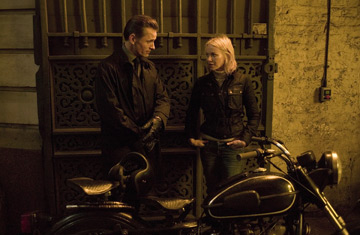
Viggo Mortensen and Naomi Watts in David Cronenberg's Eastern Promises
At the Toronto International Film Festival, sleep is for wimps. With the first screenings beginning at 9 a.m., and the last one ending around two the next morning, all that's allowed is a catnap in the dark theater before the show begins, and a six-hour collapse on your cot before dawn.
Eating is also on the fly. True TIFF junkies want to vacuum-pack as many movies into their schedule each of the 10 days, so a sit-down meal is out of the question. True believers get a take-out sandwich at a deli, or scarf on a Big Mac, anything to be gobbled while standing in the long queues for films. Or they buy a snack at the concession stands inside. I know people for whom breakfast, lunch and dinner here is a nacho, a bag of popcorn and a hot dog. They figure they'll sleep, and slim down, in October — if they last that long.
Audience members may shorten their lives by their urge to see 50 or 60 of the 349 films at the festival. But moviemaking may prolong your life, at least to judge from the actuarial evidence of this year's directors' list. The Portuguese doyen, Manoel de Oliveira, indestructible at 98, had a film here (he co-starred with his grandson), as did Eric Rohmer, 87, Richard Attenborough, 84, Sidney Lumet, 83, and Youssef Chahine, 81. But to prove that standing behind a camera isn't just an old man's game, the festival is showing Buddha Collapsed Out of Shame, directed by Hana Makhmalbaf, who turned 19 this month.
Toronto earned its rep by showcasing films the rest of North America will hear about in the run-up to the Academy Awards. These English-language worthies clog the gala presentations, which play to the well-heeled locals who dress up for evenings in the cavernous Roy Thomson Hall. The traditional gala is a film on an Important Subject from a pedigreed director starring actors who have won Oscars. That's the packaging; sometimes quality is optional.
This year's Rendition, for example, is a fictional version of the Bush Administration's policy of outsourcing the torture of terror suspects to foreign governments. It stars Jake Gyllenhaal as a U.S. agent observing the grilling of a suspect, Meryl Streep as his cia boss and Reese Witherspoon as the suspect's confused, then angry wife. Director Gavin Hood (the South African who won a foreign-film Oscar in 2006 for Tsotsi) has all the makings of a provocative drama but trips over all the good-guy, bad-guy cliches.
Another gala, Michael Clayton, is a more honorable achievement. It stars George Clooney as a law firm's "fixer": he has the wiles and the connections to get the firm's clients, and sometimes its partners, out of potentially career-ending embarrassments. When he realizes there's something horribly shady in a lawsuit involving plaintiffs injured by a client's products, Clayton is faced with an ethical dilemma he may not be able to navigate. He needs his own fixer, and nobody can do that job. Writer-director Tony Gilroy does a slick job blending the paranoid-thriller genre with a study of a smart operator backed into an emotional crisis.
Paul Haggis, a Canadian writer-director, won the Best Picture Oscar last year for his race-relations drama Crash. His new film, In the Valley of Elah takes a stronger, more nuanced look at the Iraq war, with Tommy Lee Jones brilliant as a father sleuthing out the fate of his soldier son. Another Iraq movie based on a true story, Brian De Palma's Redacted, uses purportedly documentary materials — TV newscasts, YouTube videos, picture-phone chats — to reconstruct the infamous rape of an Iraqi girl and the murder of her family. Redacted is overheated, Elah temperate, but both are potent portraits of the disasters of war.